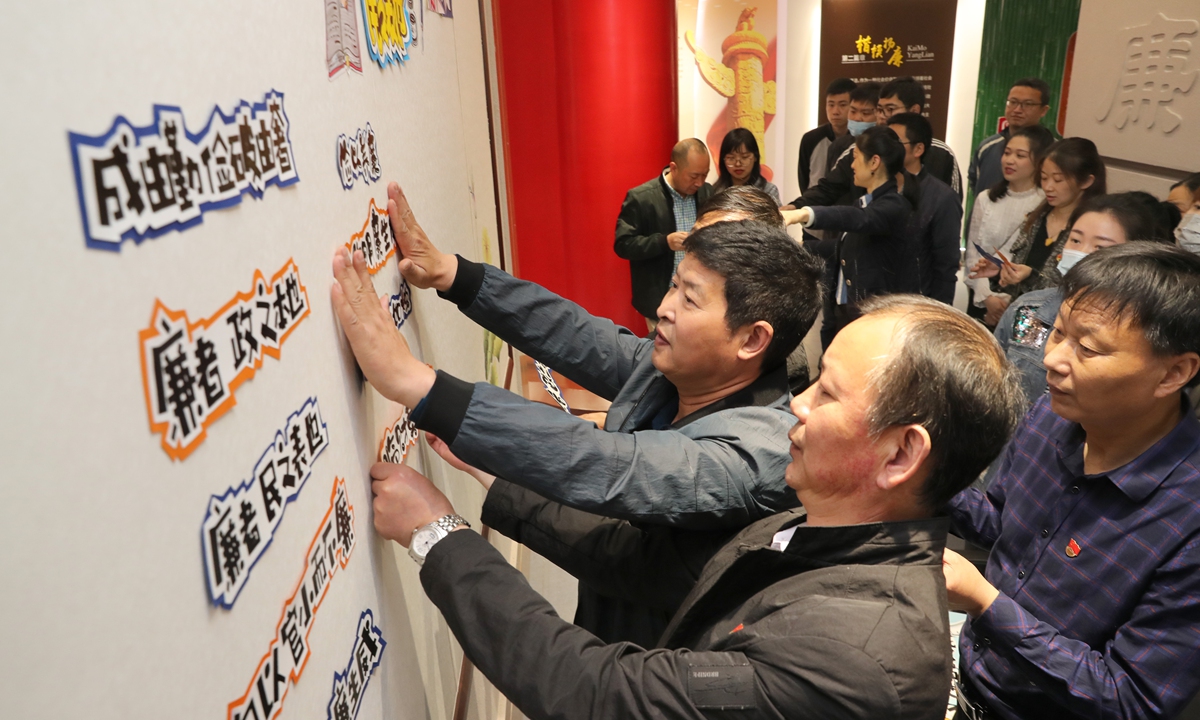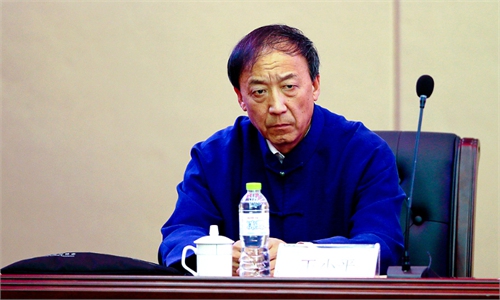
Local civil servants decorate a themed wall at an exhibition featuring combating corruption and building a clean government in Nantong, East China's Jiangsu Province. Photo: IC
China's top anti-graft watchdog has vowed to resolutely investigate and punish new and covert forms of corruption such as "shadow companies," "shadow shareholders" and the "revolving door" between government and business, adopting new technologies and measures such as big data to step up and improve the efficiency of anti-corruption efforts.
The Communist Party of China Central Commission for Discipline Inspection (CCDI) said on its website on Saturday that corruption continues to emerge and exhibit new characteristics. Although the momentum of corruption has been effectively curbed, the task of eradicating the breeding ground for corruption remains arduous.
Both the 20th CPC National Congress and the second plenary session of the 20th CCDI have emphasized China's resolution in cracking down on corruption in new and covert forms in the long run, with both bribes offering and taking inspected at the same time.
In recent years, disciplinary inspection organs across the country have watched closely the key industries and critical links with concentrated power, intensive funds and rich resources, and continuously strengthened the investigation and punishment of new types of corruption such as "shadow companies" and "shadow shareholders." As a result, the space for exercising power for personal gains has been largely suppressed and exchanges on the chains of interest greatly cut off.
CCDI disclosed on its website several anti-corruption cases through "shadow companies" and "shadow shareholders" that have been solved over the past years. The companies were registered legally in accordance with laws and regulations but adopted covert means to transfer benefits to officials that outsiders could hardly find.
It is the key to investigations to sort out the relationship between the investigated object and the affiliated company from a lot of complicated information, said Zeng Xiangyang, an anti-corruption official from Luzhou in Southwest China's Sichuan Province.
In order to uncover the hidden profit chains of corruption, some local discipline inspection organs have set up big data inspection laboratories and developed individualized supervision systems.
"We can analyze based on the model and piece together information that appears to be weakly related, such as 'people, events and objects' into a rigorous supervision network, closely monitoring every aspect of the exercise of public power," said Chen Meihua, an anti-corruption official from Jiande in East China's Zhejiang Province, noting that through big data comparison and verification of the business information of CPC members, leading officials and personnel in key positions and their relatives, they can identify clues to the problems in a timely manner and improve the quality, efficiency and accuracy of supervision.
In the case of Yang Chuansong, a former official in Pizhou, East China's Jiangsu Province, Yang arranged for his relatives in their 60s without professional or management capabilities to operate two "shadow companies" and falsely undertake businesses to embezzle public funds. They took bribes of a total of 530,000 yuan ($77,732) between 2016 and 2018.
Quick breakthroughs were made in resolving the case thanks to big data analysis, which accurately targeted the evidence and saved time, according to the anti-corruption officials of the local discipline inspection department.
"No matter how covert the method of corruption is, it always leaves traces," said Xiong Junbo, an anti-corruption official from Lianyungang in Jiangsu Province.
Global Times


